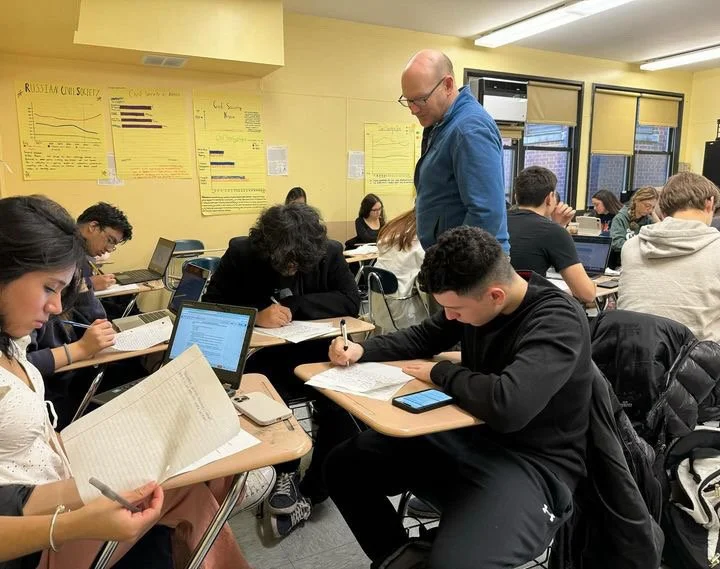AP Comparative Government Class Introduces Students to Foreign Politics
AP CoGoPo focuses on various foreign governments instead of the U.S. Photo: Breniece Ng
By BRENIECE NG and LIZI SOKHADZE
This year, Midwood introduced students to AP Comparative Government and Politics, an advanced placement history class taught by Mr. Joseph Peters. This class is eligible for juniors and seniors who have already received U.S. History Regents credit.
“I proposed that the department offer AP Comparative Government and Politics as a way to challenge students and broaden our opportunities,” said Mr. Peters.
As with other AP courses, the class gives students the opportunity to earn college credit if they successfully complete the AP exam in May with a score of three or higher.
But how is this class different from AP Government and Politics, which Midwood already offers? Assistant Principal of Social Studies Beth Vershleiser explained that in the older AP Government class, “we spend a great deal of time focusing on the workings of the American executive, legislative, and judicial systems,” such as the electoral college, the Supreme Court, and how the Constitution works within our democracy. On the other hand, the new AP Comparative Government “examines the political structures, policies, and political, economic, and social challenges of six selected [foreign] countries: China, Iran, Mexico, Nigeria, Russia, and the United Kingdom.”
The new class, which Mr. Peters abbreviates as AP CoGoPo, focuses on the contemporary world and “dives deep” into those six very different nations that have a tremendous impact on world affairs. “Knowing about these countries will help make students better prepared for the future, no matter what career they end up in,” he said.
“Honestly, the class was not what I expected, but it is interesting to learn more about politics and study the different governments,” said Joanna Cai ‘25. “We don’t really explore the U.S., which might be a dealbreaker for people, but I think overall it is fun to learn more about other governmental structures as well.”
Eden Azayeva ‘25 said, “I do like how this class focuses on governmental systems outside the U.S. because I think it’s really important to learn about the rest of the world as well.”
Cai said that for her, the class is more challenging than she had thought. The tests are “quite difficult,” but the classwork is not bad, she said.
Jonathan Hart ‘25 said the workload in the class is fair, and the tests are spread out evenly throughout the semester.
Azayeva agreed: “The workload is reasonable; I feel like it’s a good amount for an AP course.” She feels quite involved within the class, she added, because it’s “really interactive” with all the presentations and the “informative and interesting discussions.”
“My favorite part about the class is collaborating with other students and meeting new people,” said Hart. “I feel engaged a lot due to our constant debates about current events or controversial opinions.”
“If you are interested in political science and want to explore it in the future, then this is the perfect course for you,” said Cai.

